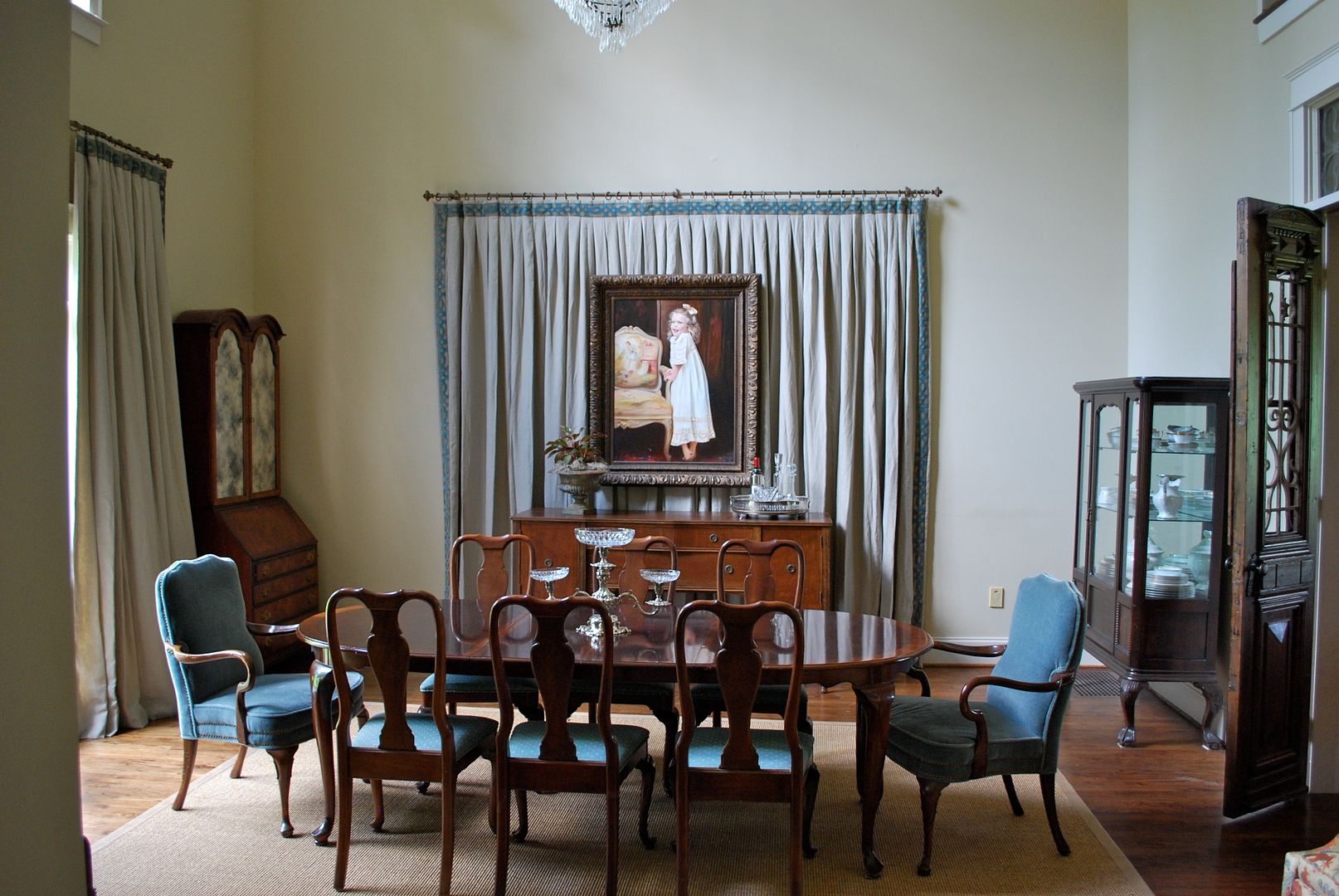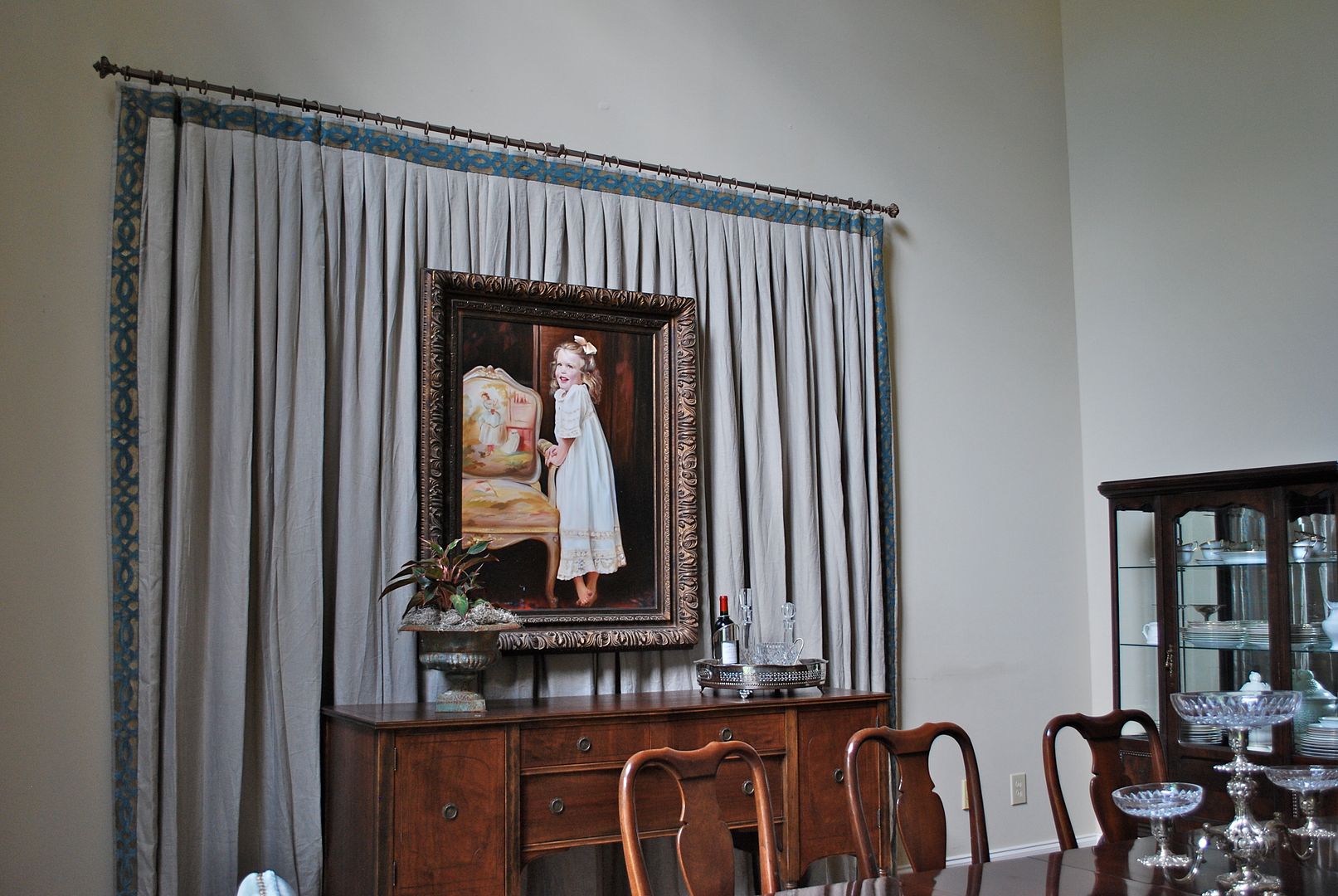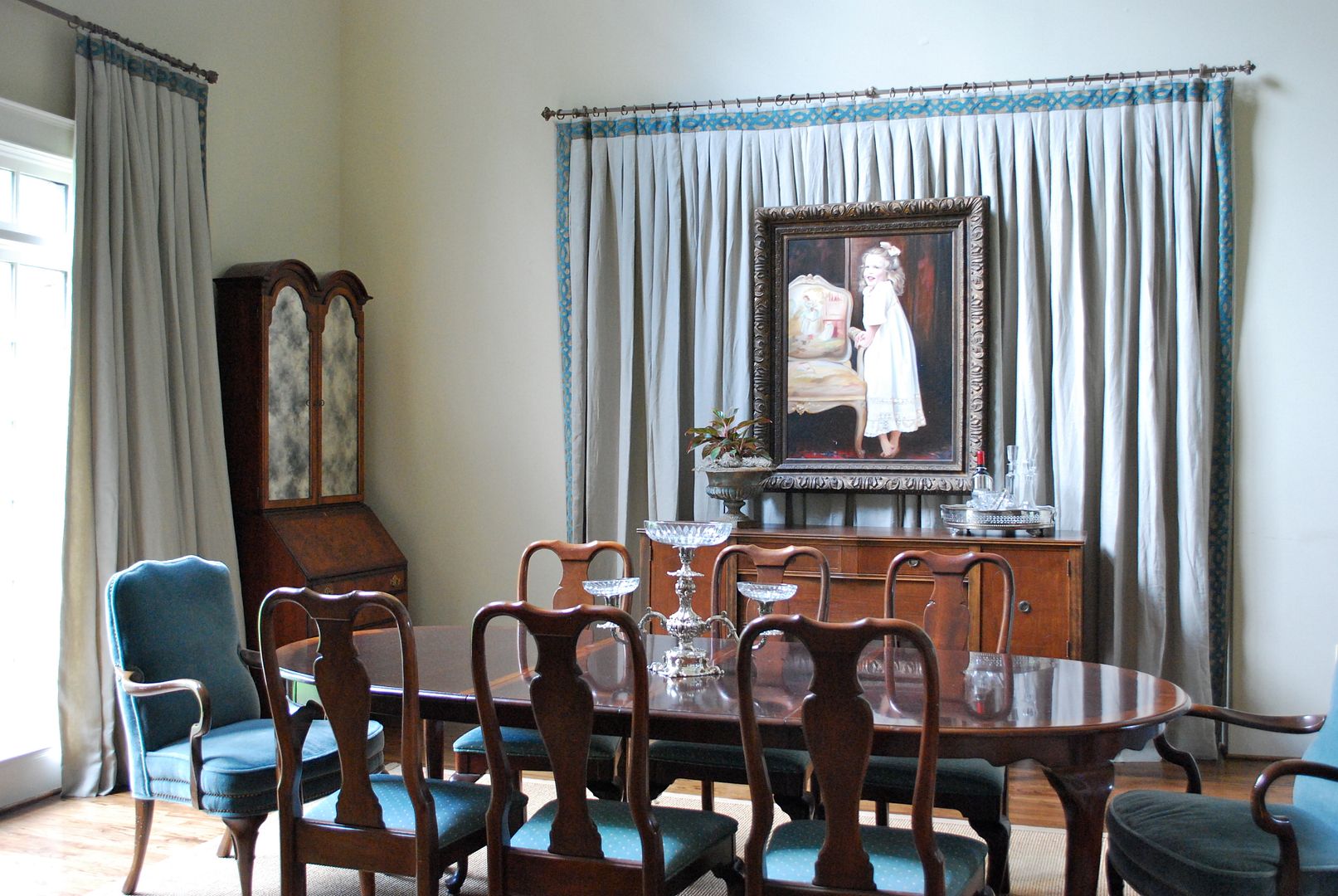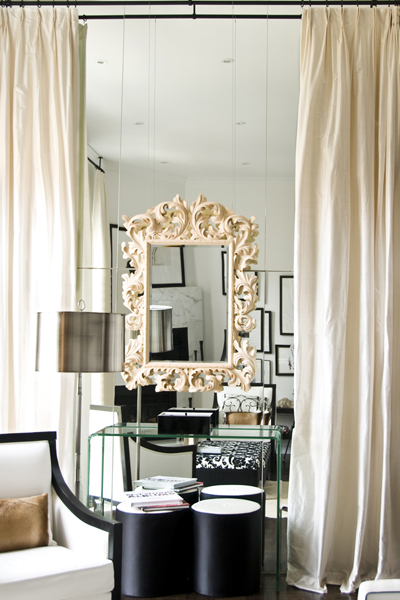Happy Monday, all! A few weeks ago, I posted about a formal dining room project. We used a gorgeous linen drapery panel to hide a large off centered opening into a secondary room.
Originally, this room was the formal living room and the room beyond the formal dining room. But the homeowner's were not using the living room and needed a main floor office. So, we flipped the dining room to the original living room space; and then used the drapery panel to divide "hide" the opening into the new office (which can be accessed from the kitchen). Are you getting all this?!
Mandi Smith T Interiors
The result of all this flipping and switching? The homeowner now has a beautiful formal dining room you see when you enter the home and she also has a private office area (off of her kitchen) where she can spread out and work. As an added bonus, the drapery wall also created a focal point large enough to layer her buffet and a portrait of one of her children.
So, I know your asking this question - when should I consider a drapery wall? There are only a few times I think a drapery wall is appropriate. But when they work, they work! Let's talk about the perfect situations for this special trick.
Non-Permanent Wall
Consider the drapery wall when you need to separate two rooms, but you're the noncommittal type (just kidding) but you don't want to permanently alter any walls which can be expensive.
This image is of Vincent Wolfe's loft in New York. In this case the drapery wall provides privacy when needed but can still be opened for light/flow on occasion.
Light Filled Space
If your room has plenty of light and closing up one doorway or window will not dramatically effect the overall feel of the space. Then a drapery wall is one solution for creating a cozy soft feel to a room.
Zero Wall Space
When your room has so many doorways and windows, there is zero wall space for furniture pieces and artwork. Then, consider a drapery wall. In the image below, there is no way to know for sure, but the drapery is either layered over windows or just a very small wall (between the windows) not giving you the space to hold this large upholstered bed. With the drapery panel, you get a total Wow behind the bed.
OK, I realize this is not the clearest image (I grabbed it off Pinterest and it looks to be a photograph of a magazine page), but this is the perfect example of creating a wall for a large piece of furniture. Notice this drapery wall is layered over an open stairwell.
Awkward Windows and Doors
When you have an oddly placed window or door that is throwing off the entire room and making furniture placement impossible. Then consider the drapery wall.
This long narrow room needed a spot for the bed, so the fabric (in the same color as the grass clothe walls) unifies this window wall and creates the perfect spot for the bed.
Originally, this room was the formal living room and the room beyond the formal dining room. But the homeowner's were not using the living room and needed a main floor office. So, we flipped the dining room to the original living room space; and then used the drapery panel to divide "hide" the opening into the new office (which can be accessed from the kitchen). Are you getting all this?!
Mandi Smith T Interiors
The result of all this flipping and switching? The homeowner now has a beautiful formal dining room you see when you enter the home and she also has a private office area (off of her kitchen) where she can spread out and work. As an added bonus, the drapery wall also created a focal point large enough to layer her buffet and a portrait of one of her children.
So, I know your asking this question - when should I consider a drapery wall? There are only a few times I think a drapery wall is appropriate. But when they work, they work! Let's talk about the perfect situations for this special trick.
Non-Permanent Wall
Consider the drapery wall when you need to separate two rooms, but you're the noncommittal type (just kidding) but you don't want to permanently alter any walls which can be expensive.
This image is of Vincent Wolfe's loft in New York. In this case the drapery wall provides privacy when needed but can still be opened for light/flow on occasion.
Light Filled Space
If your room has plenty of light and closing up one doorway or window will not dramatically effect the overall feel of the space. Then a drapery wall is one solution for creating a cozy soft feel to a room.
Zero Wall Space
When your room has so many doorways and windows, there is zero wall space for furniture pieces and artwork. Then, consider a drapery wall. In the image below, there is no way to know for sure, but the drapery is either layered over windows or just a very small wall (between the windows) not giving you the space to hold this large upholstered bed. With the drapery panel, you get a total Wow behind the bed.
OK, I realize this is not the clearest image (I grabbed it off Pinterest and it looks to be a photograph of a magazine page), but this is the perfect example of creating a wall for a large piece of furniture. Notice this drapery wall is layered over an open stairwell.
I love the image below. Sometimes entry ways can be tricky with no true spot to create that first impression when you enter the home. The drapery wall can do the trick!
When you have an oddly placed window or door that is throwing off the entire room and making furniture placement impossible. Then consider the drapery wall.
This long narrow room needed a spot for the bed, so the fabric (in the same color as the grass clothe walls) unifies this window wall and creates the perfect spot for the bed.
Cozy Media Room
There is one exception to the light filled room mentioned above - when you are creating a media room. A drapery wall creates a cozy cocoon of a space perfect for watching movies. It also has the added bonus of absorbing sound so you lose the echo effect.
One last image I had to show you. This is an example of the reverse effect when using drapery panels. Rather than creating a wall, this Canadian designer, Yanic Simard has used drapery panels and mirrors to create the illusion of an additional window and light. Very clever.
Sorry to digress! So, now that we've covered when to use a drapery wall, we need to talk about how to layer artwork over the drapery wall for some real impact in a space. I will be posting all the details on this later in the week. See you then! M.
















No comments:
Post a Comment